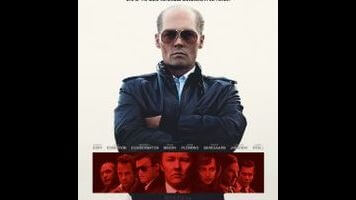Judging by crime movies of the past 10 years or so, Irish gangsters have largely supplanted Italian gangsters in the popular consciousness of the new millennium. In a roundabout way, Scott Cooper’s Black Mass addresses this process. Based on the true story of James “Whitey” Bulger, the South Boston hood who inspired Jack Nicholson’s character in The Departed, it chronicles how Bulger (Johnny Depp) was able to stay out of prison because the FBI, led by Agent John Connolly (Joel Edgerton), uses him as an informant to help take down the Italian mafia out of North Boston. Eventually, they succeed so thoroughly that Bulger comes to dominate crime in the city, unchallenged by either fellow criminals or the feds. There’s even a scene where Connolly and Bulger casually sit down to a holiday dinner.
Connolly grew up alongside Bulger, along with Bulger’s brother, State Senator Billy Bulger (Benedict Cumberbatch), and while those relationships certainly play into Bulger’s reign of terror, Black Mass isn’t the stuff of mob opera. There are no flashbacks to Connolly and the Bulgers as Southie kids, and no “as far back as I could remember” conspiratorial color in the narration, which is instead pieced together from a variety of lower-level informants left with no choice but to spill about Bulger’s operation. The relationship between Bulger and Connolly is fascinating, but doesn’t have much passion or emotional pull.
That may be because the movie’s Bulger isn’t an especially passionate guy, even when committing horrific murders. Something about working in crime movies causes Depp to tamp down his flamboyance as a performer; his work as Bulger joins Public Enemies, Donnie Brasco, and Once Upon A Time In Mexico under the “effective underplaying” heading of his resume. He also gives lie to a particularly tedious truism about his acting habits: He hides behind make-up—with a balding head and eyes so blue and still that they look iced-over—that doesn’t detract from his performance in the least. (It’s almost as if Depp knows what he’s doing with all that makeup business!) Edgerton also does strong work as the more relatable Connolly, whose excitement at combining his professional and personal lives turns him into a sort of mini-mafioso. While the movie is divided evenly between the two of them, Depp lays claim to all of the most memorable scenes: implying threats to Donnolly’s partner (David Harbour) over a family recipe and to Donnolly’s wife (Julianne Nicholson) over a faked illness; imparting his circumstantial sense of morality to his young son (“If nobody sees it, it didn’t happen”); and carrying out violence with so little hesitation that he appears unstoppable.
In these scenes and elsewhere, Cooper’s filmmaking is clean, confident, and suffused with the appropriate menace. He’s especially fond of push-ins that subtly escalate tension, and his staging of the movie’s many hits make him seem as ruthless an executioner as Bulger (however briefly). His focus is such that few other members of the enormously talented cast—which includes Kevin Bacon, Adam Scott, Dakota Johnson, Corey Stoll, and Juno Temple—has as much to do as Depp or Edgerton. The leads’ respective domestic scenes opposite Johnson (as the mother of Bulger’s child) and Nicholson feel particularly perfunctory, even with Johnson and Nicholson doing what they can. Instead of condensing years of marriage into a few scenes, the movie spreads a few minutes of material across the years.
Despite the inherent lack of fairness in comparing almost anyone to Martin Scorsese, it’s hard not to think of The Departed, what with all of the Boston accents, the cutting back and forth between line-blurring cops and criminals, and even the presence of Jesse Plemons, who looks like a beefier, less golden Matt Damon in his role as a longtime Bulger associate. Pulpy as that movie is, it pulses with life. Without an emotional core, a stronger sociological angle, or many visceral thrills, Black Mass more or less limits itself to procedural status. Within those aims, it’s a pretty good one, absorbing and well-made. But it seems like there should be a more distinctive story behind the gangster, FBI agent, and senator who have Christmas dinner together.


 Keep scrolling for more great stories from A.V. Club.
Keep scrolling for more great stories from A.V. Club.